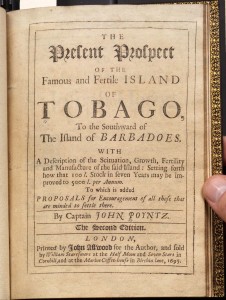Trinidad/Tobago
I celebrate the 250th post to this blog with a note that we have some great early Caribbean resources, which can relate not only to academic work on campus, but real-world cultural studies, like the “Trinity-in-Trinidad” program.
Relation de L’Isle de Tabago (Paris, 1666). Charles de Rochefort (1605–1682) dedicated this work to three men who formed a project to encourage settlers in the island of Tobago. They had transported a number there under the auspices of the States-General of the Netherlands, and this work was intended as a guide for settlers—giving details of the customs of the indigenous people, climate, and the island’s potential for production (including sugar cane, ginger, and especially tobacco).
As you can see from both of these works, the Dutch and the English (not to mention the French) were hugely interested in developing colonies in the Caribbean, in order to compete with the Spanish and the Portuguese imperial projects which had been in operation for well over a century by the time these two works were published.
The Present Prospect of the Famous and Fertile Island of Tobago (London, 1695). In 1681, four ships commanded by John Poyntz (1629-1712) captured a Dutch settlement on Tobago. In 1681, he obtained 120,000 acres on the island on behalf of a group of merchants, and two years later he published this pamphlet promoting the benefits of the island as a place to settle. This “very well informed survey” (Oxford DNB) describes the climate, flora, fauna, and timber of the island, and prospects for growing cocoa, sugar-cane, and tobacco. Several hundred settlers from Barbados moved to Tobago, but the king blocked Poyntz’s project and they were returned to Barbados.

